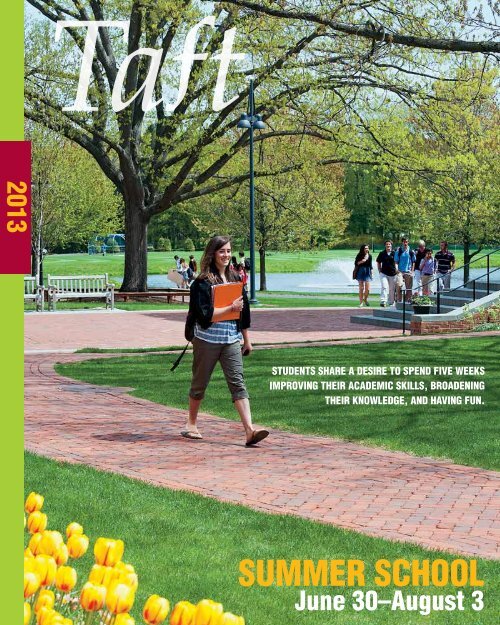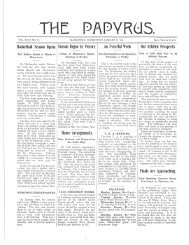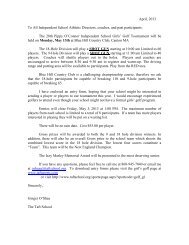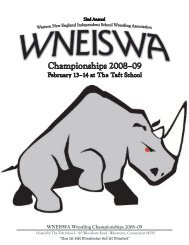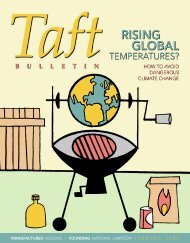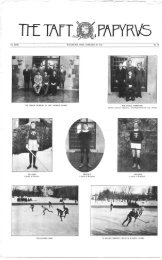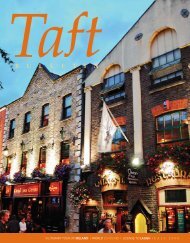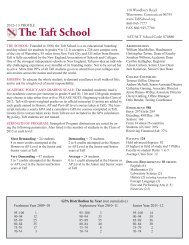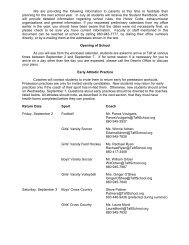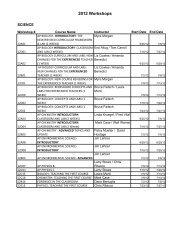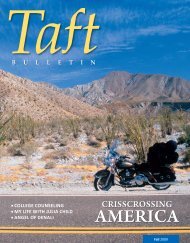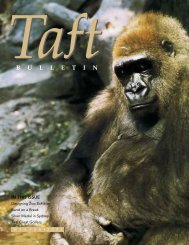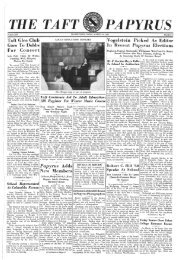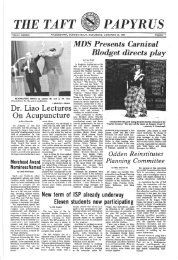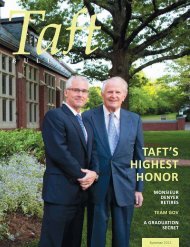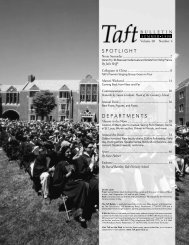2013 Catalog - The Taft School
2013 Catalog - The Taft School
2013 Catalog - The Taft School
- No tags were found...
You also want an ePaper? Increase the reach of your titles
YUMPU automatically turns print PDFs into web optimized ePapers that Google loves.
<strong>The</strong> <strong>Taft</strong> <strong>School</strong>Established in 1890 by Horace Dutton <strong>Taft</strong>, brother of President William Howard<strong>Taft</strong>, the <strong>Taft</strong> <strong>School</strong> quickly earned a reputation as a school for the education ofscholars and leaders. <strong>The</strong> <strong>School</strong>’s motto, “Not to be served but to serve,” has beenan important hallmark of <strong>Taft</strong>’s special niche in the development of well-roundedmen and women. <strong>The</strong> <strong>School</strong>’s 6,000 living alumni are engaged in virtually everyphase of the world’s work—business, industry, the professions, and public service.“…..the program was sowell organized and allthe teachers are veryresponsible and careabout the students’growth and progress.”Facilities<strong>Taft</strong>’s 220-acre campus includes sixseparate dormitories, the 53,000-volumeHulbert <strong>Taft</strong>, Jr. Library, the Ivy KwokWu Science and Mathematics Center,a modern infirmary, and the 527-seatBingham Auditorium.<strong>The</strong> Arts and HumanitiesCenter contains classrooms, facultyoffices, the Student Union, a largedance studio, special practice rooms,spacious art rooms, and featuresa black box experimental theaterwhich seats 200 people. <strong>The</strong> StudentUnion has ping-pong and pool tables,large screen televisions, a completesnack bar, and spaces for students tosocialize and relax.<strong>The</strong> McCullough Athletic Centercontains a field house for basketballand volleyball, four indoor tenniscourts, a state-of-the-art strengthtraining center, full locker facilities,and nine squash courts; all of whichare suitable for international play. Inaddition to <strong>Taft</strong>’s athletic fields, twelvetennis courts, and an all weatherrunning track are available.<strong>The</strong> Lady Ivy Kwok Wu Scienceand Mathematics Center openedas the <strong>School</strong>’s “gateway to the 21stcentury” in 1997. This new buildingis <strong>Taft</strong>’s response to growing studentinterest and changes in methods ofinstruction. Its imaginative designjoins the new building to the Hulbert<strong>Taft</strong>, Jr. Library, creating a unifiedlearning center housing the library,science and mathematics classroomsand faculty offices.June 30–August 35
DAILY LIFEClasses begin after breakfast at 8:00 a.m. and continue through the earlyafternoon. At 9:30, after first period, students have a break or on Tuesdays andFridays, attend the school assembly. Lunch begins at 11:30 after second period, andclasses resume at 12:30. <strong>The</strong> Athletics period begins at 3:15 p.m. each weekday. Aftersports, students are free to work in the library, play games in the student union,walk to town or simply relax until dinner.“My daughterhad a marveloussummer at <strong>Taft</strong>!”DressDress for classes, meals and otherschool appointments is informal, withgood taste and neatness prevailing.Shorts and slacks are permitted.Frayed or patched clothing is not.With the exception of ear piercing,facial or body piercing of any kind isnot permitted. Students are requiredto bring items of more formal attirefor certain functions both at and awayfrom the school.Dormitory LifeSummer <strong>School</strong> faculty members andteaching interns live in the studentdormitories, and though the basicorganization on the corridors isinformal, structured study halls in theevening and constant faculty presencein the dormitories are recognized asessential to developing an atmosphereconducive to learning.While <strong>Taft</strong> does have some singlerooms, most students can expectto have a roommate. <strong>The</strong> rooms areequipped with basic furnishings, anda list of additional things to bring willbe supplied to the students severalweeks prior to arrival. Each student isresponsible for the condition of his orher room, and all boarding studentsshare in the cleaning of commonrooms and corridors.<strong>Taft</strong> is a wireless campus andwhile it isn’t mandatory, boardingstudents are encouraged to bringa laptop computer for use duringstudy hall. Personal audio equipment(iPods, etc.) are permitted, but the useof headphones is encouraged and maybe required during certain specifiedperiods. Televisions are only available foruse in the common rooms. All studentrooms are equipped with phones, butmost students choose to carry a personalcell phone (not to be used during classor other school activities).Worship in Daily<strong>School</strong> LifeWhile <strong>Taft</strong> is a nonsectarian school,students are encouraged to attendthe church of their choice. Catholic,Congregational, Episcopal andMethodist churches in Watertownare all within walking distance of thecampus. Transportation to synagoguesin Waterbury can be arranged throughthe Summer <strong>School</strong> Director.“My son is still talkingabout all the great peoplehe met. It was a greatsummer for him!”7June 30–August 3
DAILY LIFEDL8AthleticsEach summer school student mustparticipate in athletics on weekdaysfrom 3:15–4:30. <strong>The</strong> program isrecreational and instructional. Sportsoffered vary according to the interestsof the students in the program, andin past summers they have includedtennis, volleyball, soccer, basketball,aerobics, running, squash, ultimatefrisbee and weight training.Medical Services<strong>The</strong> Martin Health Center is a fullyequippedfacility with a registerednurse on duty at all times. In additiona physician is on call throughout theday. Emergency medical service isavailable at St. Mary’s Hospital, whichis a ten minute drive from the campus.DisciplineStudents are expected to meet certainclearly defined standards of behavior,as reflected in the Fundamental<strong>School</strong> Rules. Fundamental Rules,which pertain to such matters aspersonal integrity, academic honesty,the use of alcohol, drugs, or tobacco,the use of automobiles, and thefulfilling of all school responsibilities,are designed to protect the rights and,most importantly, the safety of theindividual and to promote the smoothoperation of the community as awhole. In addition, students may notsmoke on campus, in Watertown, oron school trips.<strong>The</strong> Director of the Summer<strong>School</strong> and the Dean of Studentsreserve the right to dismiss any studentwho cannot abide by the rules of the<strong>School</strong> or whose conduct is consideredharmful to himself or to the <strong>School</strong>.Experience has shown us thatstudents who are sincerely interestedin making their school experience avaluable one do not find it difficult tofollow the rules of the <strong>School</strong>.“My friends and I had so muchfun during spirit week…! I amgoing to miss everything at<strong>Taft</strong> soooooo much. Thankyou for giving us such awonderful and unforgettablesummer. I must say this is thebest summer I have ever had!”<strong>Taft</strong> Summer <strong>School</strong>
BEYOND THE BOOKSOn the WeekendsOn the weekends, school-wide activities or trips on campus are organized.All boarding students are expected to attend unless granted prior permission.Provided the required forms are filled out in the Summer <strong>School</strong> Office, studentsmay leave school on the weekends, but are still expected to attend classes onSaturday morning. If choosing to leave campus for the weekend, students mustreturn to school by study hall on Sunday evening. However, students are stronglyencouraged to remain on campus for the weekends in order to participate in theextracurricular and organized social activities. In Watertown, within walkingdistance from <strong>Taft</strong> is a small movie theater, ice-cream parlor, and pharmacy. <strong>The</strong>reare several fast-food restaurants nearby that also deliver. <strong>School</strong> sponsored shuttlesremain common among students for their endless desire to revisit the malls. Allof these commodities are of course available to students, but are unnecessarybecause of the busy social calendar and abundance of activities planned. Last year,weekend trips included visits to:Other Trips And Activitiesj DJ Dancesj Moviesj Shopping tripsj Lake Compounce Amusement Parkj Connecticut Science Centerj Yale Universityj Bowlingj Athletic competitionsj Summer <strong>School</strong> Arts FestivalNew York CityThis popular Saturday trip to thetheater district in New York Citybegan with lunch at the Hard RockCafé, followed by a visit to the Lunt-Fontanne <strong>The</strong>atre to view the newmusical Ghost.<strong>The</strong> day ended at Grand CentralStation, after lots of shopping andsightseeing in Times Square.Boston<strong>The</strong> day began with an educationalstroll on the historic Freedom Trail andfrom there, the students made their wayto Quincy Market where they enjoyedlunch and shopping at Fanieul Hall.<strong>The</strong> afternoon included a visit to theNew England Aquarium and IMAX<strong>The</strong>atre, as well as more shopping atBoston Common and Newbury Street,ending the day at the Prudential Center.June 30–August 39
Academic offeringsYoung Scholars ProgramAC10<strong>The</strong> Mission:This program is designed for studentswho are entering grades 7, 8 and 9(applicant must be 12 years of ageby June 1 of current year). Aimed atyounger men and women who intendto take on the challenges of rigorouspublic and private secondary schools,this program focuses on buildingessential skills and on instillingstudents with greater confidence asthey look ahead to seventh, eighthand ninth grade, and, further downthe road, to the demands of a collegepreparatory program.Young Scholars course offerings100-Level Courses<strong>The</strong> Program:Each student takes two 100-level(major) courses, and two 200-level(minor) courses.We suggest that those enteringseventh and eighth grade takeLiterature and Composition I, Pre-Algebra or Introduction to Algebra,the Testing, Reading, and Study Skillscourse, as well as another elective oftheir choosing.Students entering ninth gradegenerally take Literature andComposition II, Introduction toAlgebra, and the Testing, Reading, andStudy Skills course.200-Level CoursesOf course, students with specificacademic needs can select anyappropriate course from the selectionlisted below.Extracurricular andAthletic Offerings:Outside the classroom, YoungScholars students take advantageof all the cultural, athletic, andrecreational opportunities of theSummer <strong>School</strong>. <strong>The</strong>ir daily schedulefollows the same pattern as that of theLiberal Studies student.Residential Life:As the residential units are organizedaccording to age, the younger studentsdo live with one another and not withthe older students.English Department110. Literature and Composition I111. Literature and Composition IIMathematics Department120. Pre-Algebra121. Introduction to AlgebraScience Department130. Biology131. Physical Science134. Introductory EnvironmentalScience – New!Language Department140. Introduction to French141. Intermediate French142. Introduction to Spanish143. Intermediate Spanish144. English as a Second LanguageHistory Department150. Modern United States History151. Modern United States History – ESLArts Department160. Studio Art161. Photography162. Clay WorkshopEnglish Department210. Creative Writing211. JournalismLanguage Department220. Young Scholars Spanish221. Conversational EnglishScience Department225. Contemporary Environment Issues226. Introduction to Organic Farming – New!History Department243. Current Events250. Research PaperArts Department231. Introduction to Photography233. Acting234. Introduction to Studio Art236. Digital Video Production237. Explorations in ClaySpecial Electives240. Testing, Reading and Study Skills241. Testing, Reading and Study Skills – ESL244. Public Speaking247. Introduction to Psychology248. Preparing for the SSAT Exam: Verbal249. Preparing for the SSAT Exam: MathAcademic Counseling:During the summer, the Young Scholarsstudents are encouraged to meet withtheir advisors, their veteran teachers, anda <strong>Taft</strong> admission officer to help themanticipate the hurdles ahead of them. Itis hoped that these conversations willlead to specific strategies for successfullymeeting the demands of a collegepreparatory curriculum. By takingadvantage of these resources, studentscan gain a clearer sense of what will beexpected of them and of how to meetthese expectations in an organized andsystematic fashion.For those students who areconsidering attending a privatesecondary school, the resources availableat <strong>Taft</strong> can also be used to address avariety of issues germane to applying toand attending private schools.<strong>Taft</strong> Summer <strong>School</strong>
<strong>The</strong> Liberal Studies Programthe Liberal Studies course offerings<strong>The</strong> Mission:<strong>Taft</strong> has long held that a liberalarts education is the cornerstoneto a productive life of service andhappiness. To that end, students areencouraged to take a variety of coursesin different disciplines.<strong>The</strong> Liberal Studies Programoffers major courses (100-level) andelectives (200-level) to studentsentering grades 10, 11 and 12.(Occasionally, with the Director’spermission, students in the YoungScholars Program can select a coursefrom the Liberal Studies Program.)<strong>The</strong> Program:Each student is required to take two100-level courses and two 200-levelelectives. Courses on both levels arestructured so that students will beginworking on their homework in class,allowing them to ask questions andconfer with the teacher as problemsarise. Nevertheless, students shouldexpect approximately two hours ofwork during the evening study hall.If a course is filled by the date anapplicant is accepted, or if enrollmentin a particular course is not sufficient,then the next available course choicewill be honored. When possible,students will be notified prior toregistration if a change must be made.It is essential that applicants listcourses in order of preference, includingalternate course choices, on theapplication form.Academic Credit:<strong>Taft</strong> does not offer academic creditfor courses taken during the summer.We will be glad to forward a syllabusof work covered and final reportsto a student’s school if requested.100-Level CoursesEnglish Department111. Literature and Composition II112. Literature and Composition IIIMathematics Department122. Introduction to Geometry123. Introduction to Algebra II124. Introduction to PrecalculusScience Department130. Biology131. Physical Science132. Chemistry135. Advanced EnvironmentalIssues – New!Language Department140. Introduction to French141. Intermediate French142. Introduction to Spanish143. Intermediate Spanish144. English as a Second LanguageHistory Department150. Modern United States History151. Modern United States History – ESLArts Department160. Studio Art161. Photography162. Clay Workshop163. Advanced Studio ArtSome institutions may wish to givestudents credit or administer their ownexaminations at the end of the summerto determine the extent of a student’sprogress. Students who must makeup a deficiency should discuss withtheir own schools what allowanceswill be made for certification ofwork completed at <strong>Taft</strong>. Only in rareinstances can a student complete thework required to pass a course failedduring the school year, as <strong>Taft</strong>’s summercourses are not designed to review anindividual student’s yearlong course.200-Level CoursesEnglish Department210. Creative Writing211. JournalismLanguage Department221. Conversational EnglishScience Department225. Contemporary Environment Issues226. Introduction to OrganicFarming – New!History Department242. Introduction to American Government243. Current Events250. Research PaperArts Department231. Introduction to Photography233. Acting234. Introduction to Studio Art236. Digital Video Production237. Explorations in ClaySpecial Electives244. Public Speaking245. Preparing for the SAT Exam: Verbal246. Preparing for the SAT Exam: Math247. Introduction to Psychology251. Time Management, Organizational,and Test-Taking Strategies – New!June 30–August 311
100-Level coursesL112English DepartmentWhile several courses of varying levels of complexity are offered, the primary goals ofthe summer school English program are to teach students to write and speak clearlyand to help them to analyze and understand what they read. Small classes allowteachers to evaluate student writing regularly and thus enable each individual todevelop the ability to communicate ideas more effectively. <strong>The</strong> content of the readingsis of secondary importance as the aim of our program is the development of techniquesthat will enable students to better deal with the tasks of writing and analysis in futurecourses in their schools.* International Students: Placement in the appropriate English program is determined bythe scores on a placement test and through a writing sample provided by each student on the firstday of classes.110. Literature andComposition IIntended for students entering theseventh and eighth grade, this coursefocuses on building fundamental readingand writing skills. Most classes combinea consideration of the principles of clearwritten expression with the close, criticalreading of narrative and dramatic fiction.A review of grammatical principles laysthe foundation for studying expressionat the level of the sentence, andparticular attention is paid to effectiveuse of coordination and subordinationand to correcting common sentencefaults. Concurrently, students learn towrite focused, purposefully developedexpository paragraphs, and during thelast week, they compose a completeessay. Significant time is spentapproaching systematically the varioussteps of the writing process, includingbrainstorming to generate ideas,selecting appropriate organizationalstrategies, outlining, and revising andediting a rough draft in order to producea polished expression.Students read a selection of shortstories and either a short novel or a play.Seminar-style class discussions stress thecritical approach to literature; in thesediscussions students learn about theelements of fiction as they learn to readclosely and carefully. To complement thisendeavor, students regularly write shortparagraphs in which they closely analyzepassages from the reading. Those who takethis course can expect to enter the seventhor eighth grade having become moredisciplined and more confident readersand writers.111. Literature andComposition IIDesigned for students entering the ninthand tenth grades this course strives tomake students more disciplined, effectivewriters and more careful, thoughtfulreaders. Students devote half of theirtime in and out of class to masteringthe skills necessary to write clearly andpurposefully; they spend the remainderof their time learning to read and analyzechallenging literature.<strong>The</strong> writing instruction is designedto enhance students’ command of writtenexpression. <strong>The</strong>y learn to composegrammatically sound, controlledsentences by reviewing the principlesof grammar, paying particular attentionto common sentence faults and toeffective coordination and subordination.Concurrently, students are instructedin the fundamentals of paragraphconstruction: they learn to composeeffective topic sentences and to employa variety of strategies to develop thosetopic sentences in a unified and coherentfashion. Finally, as they write papers onspecific topics, students are systematicallyexposed to the various stages of thewriting process. <strong>The</strong> course reviews the“My daughter truly loved<strong>Taft</strong> this summer. <strong>Taft</strong>sparked an intellectualcuriosity in her,impressing both myhusband and I.”techniques of brainstorming, organization(outlining and “mapping”), and editing,and it stresses the importance of detail toclear expression. Throughout the session,students prepare a number of papers—paragraphs at the outset and completeessays in the last two weeks—on topicsranging from personal narratives toliterary analysis.Students become more skilledreaders by considering a selection of shortstories and a novel. Class discussions,focused on the close reading of specificpassages, teach the students to readcarefully and critically. <strong>The</strong>ir analyticalskills become more finely tuned as theylearn about the elements of fiction andabout specific literary devices. This criticalapproach is complemented by regularshort written exercises in which studentslearn to express clearly their reactions towhat they read.112. Literature andComposition IIIThis course, designed for studentsentering the eleventh and twelfth grades,resembles Literature and CompositionII in that it also stresses the developmentof students’ abilities to write clearly andto read critically. However, it is muchmore ambitious and sophisticated in itsapproach to both goals.<strong>The</strong> course resembles a collegeseminar in that its focal point is readingand writing about literature. <strong>The</strong> first<strong>Taft</strong> Summer <strong>School</strong>
two weeks are devoted to a study ofthe elements of fiction—character,conflict, setting, and theme—as they aredeveloped in several short stories. Duringthe final three weeks, students study aplay and a novel. In order to appreciatemore fully the possibilities of language,students spend one class per weeksystematically considering a selection ofpoems. As they consider this variety ofliterature, students study various literarydevices and are introduced to a variety ofcritical terms.Students write in or out of classalmost every day. Generally, writingassignments are of two types: short,detailed analyses of passages fromthe work being studied, and longerparagraphs and essays analyzing abroader idea or element in the work.As students undertake the longerpapers, they review such fundamentalsof composition as effective topicsentences and thesis statements, unityof expression, and logical transitionsbetween sentences and ideas. Andalthough the course does not includea formal review of grammar, studentsdo discuss common grammaticalerrors in class and in conferences withtheir teachers. Evaluation of students’written work is based on its precision ofexpression, the logic and effectivenessof its organization, and the originality,validity and documentation of its ideas.Mathematics Department120. Pre-Algebra<strong>The</strong> Pre-Algebra course is designedto prepare students for an elementaryalgebra course by reinforcing the skillsnecessary for success in secondary schoolmathematics. In addition to an intensivereview, the course previews topicsfrom Algebra I, including operationswith numbers and variables, powersand exponents, order of operation andsolutions of first degree equations. Othertopics will be included as time permits.121. Introduction to AlgebraThis course is designed for those who needto strengthen their command of numericaltechniques, arithmetic, and numbersystems before beginning a formal studyof algebra. Some of the most importanttopics from a first course in algebra arealso introduced to give the student afirm foundation for later work. Linearequations and word problems are studiedto give training in the skills needed for athorough understanding of algebra.122. Introduction to GeometryThis course prepares students to takea course in geometry by introducingthe more important aspects of thestudies of shape and logic. Many ofthe important properties of geometricfigures are studied so that they will bebetter understood when encountered inthe more formal structure of Euclideanproof. <strong>The</strong>se topics include symmetry,angle, length, proportion, and parallelism.<strong>The</strong> fundamentals of logic and proof arepresented to give a foundation in the skillsof writing proofs.123. Introduction toAlgebra II<strong>The</strong> first half of this course reviews manyof the topics of a first course in algebra,including graphing, solution of equations,word problems, fractional expressions,and radicals. <strong>The</strong> second half of the courseexpands on these topics and presents someof the new topics of the early chapters of acourse in second year algebra. This courseis designed to give students greater facilityin the skills of algebra by requiring them towork on those techniques which improvewith practice.124. Introduction toPrecalculusDesigned for students who have alreadycompleted Geometry and Algebra II, thiscourse affords an opportunity to exploremany of the functions important to thecontinued study of mathematics leadingup to the calculus. Topics for study mayinclude, but are not limited to, linear,quadratic and polynomial functions;rational functions; exponential andlogarithmic functions, and trigonometricfunctions. <strong>The</strong>re will be an emphasison in-depth study of the selected topicsthrough applications and models. To thatend, students enrolled in this course arerequired to have a graphing calculator. <strong>The</strong>Mathematics Department at <strong>Taft</strong> currentlyuses the TI-83Plus.13June 30–August 3
100-Level coursesL114Science Department130. BiologyThis course is an introduction to thestudy of modern biology, centering onconcepts of evolution, genetics, andcell theory crucial to understandingthe development of life and science ofbiology. This course aims to provide thestudent with some comprehension of thevisible world, with an appreciation of theconnections and interrelatedness of allscientific learning. Readings are chosenfrom a variety of sources; laboratorywork, films, and occasional field work arefeatures of the course.131. Physical Science<strong>The</strong> Physical Science program isdesigned to integrate both introductorychemistry and physics fundamentalsinto a five-week class that will enablethe student to have a solid graspof beginning topics. <strong>The</strong> materialcovered will include a crash courseinto math basics such as scientificnotation, significant figures, andthe use of exponents. Other topicsare Atomic <strong>The</strong>ory and Structure,<strong>The</strong>rmodynamics, Electrostatics,Enthalphy changes in ChemicalReactions, Nomenclature, and ReactionTypes. <strong>The</strong> course will stress theinteraction of matter on the atomic andmolecular levels and as we look intothe structure of the atom and how thesubatomic particles interact within theatom and between molecules.132. ChemistryThis introductory course offers thestudent the fundamentals of chemistryand an opportunity to analyzemodern environmental and biologicalproblems from a chemical perspective.A conceptual understanding ofchemistry is taught through lectures,demonstrations, laboratory experiments,and seminar discussions. Studentsare introduced to the lab reportingprocess and practice the skill. Readingsare chosen from a variety of sources;laboratory work, films, and occasionalfield work are features of the course.Note: Open to Liberal Studies only134. IntroductoryEnvironmental Science – New!This course is an introduction tothe environmental science throughexploration of Ecology and physicalelements of the world around us.Centered through the investigationof the planet and its ecosystems, thiscourse will provide a window forstudents into the laboratory sciences ofthe high school and scientific inquiryand methods. Rather than a standardizedtext, readings will be taken from avariety of sources. Laboratory work,field trips, and use of <strong>Taft</strong> property areprominent features of this course.135. Advanced EnvironmentalIssues – New!This Environmental Science coursewill focus primarily on humans’involvement with natural systems,specifically investigating the biologicalas well as social and cultural effectsof environment issues. Students willexplore balancing the earth’s resourcesfor human society and the earth’swell-being, and students will discusssustainable practices for the future.While not specifically designed forAdvance Placement, the course willprovide an introduction to some ofthe key aspects of that course. <strong>The</strong>course will utilize field trips and thesurrounding area to better understandthe scientific policies and the integrationinto society. Researching skills anddiscussion based learning also arehallmarks of the course.Language Department140. Introduction to FrenchThis course is designed for a student withlittle or no experience in French whointends to pursue French at the secondarylevel. <strong>The</strong> basic skills of listening, reading,writing and speaking are taught. <strong>The</strong>students work in the Language LearningCenter, a state-of-the-art audio, video, andcomputer facility.141. Intermediate FrenchThis course is an intensive review offeredto students who have completed oneor two years of French, but is flexiblein structure and is easily adaptable tothe specific needs of those enrolled.<strong>The</strong> course is designed to improveeach student’s ability to read, writeand converse in French. Dependingupon the needs of the student, a first orsecond year text is used with a variety ofsupplementary materials.142. Introduction to SpanishThis course is designed for a student withlittle or no experience in Spanish whointends to pursue Spanish at the secondarylevel. <strong>The</strong> basic skills of listening, reading,writing and speaking are taught. <strong>The</strong>students work in the Language LearningCenter, a state-of-the-art audio, video, andcomputer facility.143. Intermediate SpanishThis course is an intensive review ofSpanish offered to students who havecompleted one or two years of thelanguage, but is flexible in structure andis easily adaptable to the specific needsof those enrolled. <strong>The</strong> course is designedto improve each student’s ability to read,write and converse in Spanish. Dependingupon the needs of the student, a first orsecond year text is used with a variety ofsupplementary materials.<strong>Taft</strong> Summer <strong>School</strong>
144. English as a SecondLanguage<strong>The</strong> ESL Program is divided into differentlevels. Each student is enrolled in the levelmost appropriate to his or her abilities.Placement is determined by the SLEP(Secondary Level English Proficiency)test which is administered the first day ofthe session. Students determined to needmore instruction in ESL are placed in atutorial in addition to the ESL class.Writing assignments stressorganization and grammar. Studentswrite compositions frequently, andthey are expected to develop a clear andorganized writing style, free of slang andawkward construction.During the course, students readfrom a variety of sources. <strong>The</strong>y are exposedto unedited journalistic prose, and at eachlevel students read short stories and anovel. A grammar and vocabulary booksupplement the readings. In class, studentsare required to speak only English.All ESL students have the option totake the Institutional Test of English as aForeign Language (TOEFL), an unofficialtest designed to familiarize the studentswith the TOEFL exam. Prior to the test,students take practice exercises in class.Enrollment in the ESL Program islimited. Early application and enrollmentare advisable.History Department150. Modern United StatesHistoryThis course reviews American political,social, and cultural history from thecolonial period of the 18th Century toWWII. Students will examine majoraspects of the American Revolution andthe creation of the Republic, the Civil War,World War I, and World War II. Quizzes,tests, and a paper will be the evaluationmethods. Daily reflective reading ofprimary and secondary sources prior toeach class and direct engagement in classdiscussion will be expected.151. Modern United StatesHistory-ESLThis course is identical to History 150,but reading and writing assignments aredesigned for students for whom English isa second language.Arts Department160. Studio ArtThis course focuses on exploration in thestudio. Students with limited experienceare welcome, but should expect to bechallenged. Students enrolled in the studioart course assemble portfolios througha series of projects that require creativethinking, problem solving, and attentionto aesthetics. Innovative studio art projectsconcentrate on the elements of art andprinciples of design through drawing,painting, printmaking, assemblage,installation, and even flipbook animation.<strong>The</strong>re is an emphasis on the developmentof personal style through the explorationof both traditional and non-traditionalmedia and a variety of subject matter.Art history forms the base of manyassignments and students are asked toconduct independent research as well. <strong>The</strong>course includes instruction in framing andmatting in preparation for a gallery exhibitat the end of the term.161. Photography(Traditional and Digital)This course combines traditionaldarkroom ‘wet’ practices with the digital‘dry’ process. Open for enrollment toboth beginner and advanced students,this course will address technical andaesthetic aspects of photography. Studentswill learn to develop black-and-white filmand print from negatives. In addition,they will learn the fundamentals of digitalimage adjustment, including matchingthe printed output to the image. Picturemaking values and ideas will be discussedthroughout the course. At the end ofthe summer term, students will havethe opportunity to showcase their finalproduct at the student art show.This course requires both, a 35mm cameraand a digital camera. Enrollment is limitedto eight participants.162. Clay WorkshopExplore the exciting versatility of clay. Usethe power of hands and imagination tocreate sculptures and pottery. Devoted topersonal attention, this course is for thestudent with no previous experience or forthose seeking further development of handbuilding, throwing and glazing skills. Manyhand-building methods will be explored;slab, coil, dowel, mold, pinch, trapped airand the use of textures. Basic throwing,as well as more advanced techniques, willalso be taught. Students work at their ownpace and experimentation and personalgoals will be encouraged. Students willbe able to combine throwing and handbuilding techniques to enhance theirability to build more individualized pieces.Various artists will be introduced to inspirecreative thinking. Students will have anopportunity to display their work at agallery exhibit at the end of the term.163. Advanced Studio Art<strong>The</strong> advanced studio art course movesbeyond on the introductory andexploratory, and allows students to deeplyexamine their creative self. Advancedassignments in drawing and paintingrequire students to be especially sensitiveto the abstract qualities of form andcontent of their work and others andto be eloquent in class discussions andcritiques. Areas of study include portraitand figure painting, automatic drawingand abstract expressionism, mixed mediaand installation, and illustration. Studentswill submit works to the end of term artshow, and assemble portfolios, building forfuture interests in the field.Note: Open to Liberal Studies only15June 30–August 3
200-Level coursesL218Special Electives240. Testing, Reading andStudy SkillsThis course is designed for studentswho wish to develop greater readingcomprehension, improve their reading speed,and increase their vocabulary. Techniqueswhich can help students use their study timemore effectively are also taught. Vocabularydevelopment is accomplished by the studyof prefixes, roots, and suffixes and byteaching students how to use context clues.Students are also taught how to developgreater skill in writing coherent paragraphs.<strong>The</strong>re is training in the art of taking collegeboard SAT’s and achievement tests, andthere is also frequent practice in readingarticles for development of both speed andcomprehension. Students with a wide rangeof abilities can benefit from the course.241. Testing, Reading, andStudy Skills: ESLThis course is similar to 240, with thedifference that it is designed to meet theneeds of students in the ESL program.244. Public SpeakingThis course is designed to introducestudents to the basic techniques ofeffective speaking in public.245. Preparing for theSAT Exam: VerbalThis course, taught by SummitEducational Group’s expertCritical Reading and Writing instructors,will focus on the academic skills andtest-taking strategies required to succeedon the SAT. Summit will provide studentswith a program of instruction customizedto meet their individual needs andmaximize their scoring potential. Eachstudent receives an SAT course book,practice tests, and vocabulary flashcards,as well as free access to Summit’s onlineSAT preparation supplement. <strong>The</strong> onlineprogram is available 24/7 and providesaudible and text-based lesson reviews, aswell as unlimited SAT practice problemsand quizzes. Parents and students willreceive access to Summit’s online portal,which can be used to monitor studentattendance and homework completion,obtain homework assignments, and reviewdetailed practice test score reports.246. Preparing for theSAT Exam: MathematicsTaught by expert instructors,Summit Educational Group’sSAT Math preparation balancesfundamental academic skills in algebraand geometry with essential test-takingstrategies, to offer a comprehensiveand effective preparation program forall students. Each student receives anSAT course book, practice tests, andmath flashcards, as well as free accessto Summit’s online SAT preparationsupplement. <strong>The</strong> online program isavailable 24/7 and provides audibleand text-based lesson reviews, as wellas unlimited SAT practice problemsand quizzes. Parents and students willreceive access to Summit’s online portal,which can be used to monitor studentattendance and homework completion,obtain homework assignments, and reviewdetailed practice test score reports.<strong>Taft</strong> Summer <strong>School</strong>
247. Introduction toPsychologyThis course is designed as an introductionto psychology. Topics to be covered includethe history of psychology, the mind,brain and biological bases of behavior,personality, learning and motivation,psychopathology, and psychotherapy.248. Preparing for theSSAT Exam: VerbalThis course, taught by SummitEducational Group’s expertSSAT Verbal instructors, will focus ontest-taking strategies and academic skillsin reading, synonyms, analogies, andessay writing. Summit will provide eachstudent with a program of instructioncustomized to meet their individual needsand maximize their scoring potential. Aspart of the course, each student receivesan SSAT course book and practice tests.Parents and students will receive accessto Summit’s online portal, which can beused to monitor student attendance andhomework completion, obtain homeworkassignments, and review detailed practicetest score reports.249. Preparing for theSSAT Exam: MathematicsStaffed by an SSAT Math expertfrom Summit Educational Group,this course will focus on the test-takingand academic skills necessary to maximizescores on the SSAT. Because each studenttruly learns differently, Summit customizesinstruction to meet the needs of individualstudents. As part of the course, eachstudent receives an SSAT course book,practice tests, and vocabulary flashcards.Parents and students will receive accessto Summit’s online portal, which can beused to monitor student attendance andhomework completion, obtain homeworkassignments, and review detailed practicetest score reports.251. Time Management,Organizational, andTest-Taking Strategies – New!<strong>The</strong> primary focus of this course is toincrease students’ academic performanceby teaching effective time management,organizational, and test-taking skills.Students will learn how to set goals,make choices, and establish priorities.<strong>The</strong> course focuses on organizing workspace, binders and notebooks, and howto effectively use a daily planner. Trainingwill be provided in the art of takingCollege Board and achievement tests,including development of speed andreading comprehension. <strong>The</strong> course willalso discuss strategies to minimize socialmedia distractions. Students who arenot currently maximizing their academicpotential can benefit from this course.2012 <strong>Taft</strong> Summer <strong>School</strong> ClassJune 30–August 319
2012 Summer<strong>School</strong> FACULTYFaculty members at <strong>Taft</strong> are selected on the basis of their excellence in teaching,their commitment to young people, and their desire to instill enthusiasm forlearning. <strong>The</strong> Summer <strong>School</strong> faculty is chosen primarily from the regular schoolyearfaculty and from other independent schools; in addition, several teachersfrom public schools join our staff for the summer.FA20AdvisorsA close, supportive relationship withan adult is an important ingredient ina student’s summer. Each student willbe assigned a faculty advisor at the endof the first week of classes. <strong>The</strong> advisorwill help monitor the progress of eachstudent throughout the remainder of thesession. Advisors will report to parentsin writing at the end of the summer, butshould parents have questions about theschool during the course of the summer,they should feel free to contact theirson’s or daughter’s advisor.Secondary <strong>School</strong>Counseling<strong>The</strong> Summer <strong>School</strong> offers anyinterested student an informationalsession and interview withan admissions officer at <strong>Taft</strong>.Arrangements for these meetingscan be made through the Summer<strong>School</strong> director.“We were verypleased with thecomprehensive reportback from his advisorand instructors…”“OUR SON HAD AFANTASTIC STAY AT THETAFT SUMMER SCHOOLAND HE WAS ESPECIALLYIMPRESSED BY THESKILLED INSTRUCTORS.”InternsEach summer, <strong>Taft</strong> selects severaloutstanding college upper classmenor recent graduates who are interestedin education to assist the faculty.Interns work in the classroom with asenior teacher, live in the dormitories,assist in the afternoon sports, andserve as advisors to Summer <strong>School</strong>students. <strong>The</strong>y are an essential part ofthe Summer experience, and Summer<strong>School</strong> students often form lastingfriendships with these young adults.<strong>Taft</strong> Summer <strong>School</strong>
2012 FacultyThomas W. Antonucci*M.A.T., University of NewHampshireDirectorKendall Adams**B.A., College of the HolyCrossScienceRebecca BiermanM.A., Middlebury CollegeFrenchAmber LaPointeB.A., University of HartfordEnglishNicholas MacDonald*B.A., College of the HolyCrossHistory/Dorm HeadStephen J. McCabe, Jr.*M.A., Wesleyan; BowdoinCollegeMathematicsPilar Santos*M.A., Middlebury; Santiagode Compostela (Spain)SpanishNathaniel SouthardM.A., University ofConnecticutMathematicsShannon Tarrant*B.A., Middlebury CollegeHistoryErin GoersCornell UniversityThomas F. GolaszewskiB.A., Lafayette CollegeLindsay A. HorbatuckBucknell UniversityAlyssa O’DeaB.A., Dartmouth CollegeThomas Piacenza**B.A., Davidson CollegeBenjamin Canary**B.S., Boston CollegeAsst. Dir. Of Student ActivitiesKevin ClementeM.A., University ofConnecticutMathematicsSarah DePolo**M.A., Middlebury College;BucknellESL CoordinatorEileen Fenn**M.A., Boston College;St. Lawrence UniversityHead of English DepartmentShannon M. Guidotti*B.A., Mount HolyokeScienceRyan A. MilovB.A., Amherst CollegeEnglish/Dorm HeadJournalism CoordinatorJane Paul McCarronB.A., Wheaton CollegeActingDonald Padgett*M.S.T., Rutgers; University ofNew HampshireHead of MathematicsDepartmentOscar Parente*B.S., WesleyanScience/Dorm HeadMartha K. Pascoe**B.S. St. Lawrence UniversityScience/Dorm HeadYee-Fun Yin*M.F.A., Hartford Art <strong>School</strong>,University of Hartford; YaleDigital Video Production/PhotographyJennifer Zaccara*Ph.D., University ofConnecticut; Trinity CollegeEnglish/Intern ProgramCoordinator2012 InternsDarius BrownDuke UniversityPatrick L. Clare**Tufts UniversityChime DolmaB.A., Middlebury CollegeGwendolyn ReimerB.A., College of the HolyCrossRoman SanDovalCollege of the Holy CrossEileen StewartUniversity of ConnecticutKatherine E. TomaiB.A. University of VermontBenjamin H. Zucker**John Hopkins University* Current or former<strong>Taft</strong> <strong>School</strong> Faculty** <strong>Taft</strong> <strong>School</strong> GraduateJack G. F. Hill**M.B.A., Dartmouth; BowdoinCollegeMathematicsSusan K. PeckM.A., Goddard College;Skidmore College;Studio Art/CeramicsDavid Hinman*M.Ed., Boston University;HobartDirector of AthleticsEllen Hinman*M.A., Boston College;DartmouthDean of StudentsKathryn RigleyM.S., New York Institute ofTechnology; University ofDaytonEnglish/TRS CoordinatorJune 30–August 321
AD22Admission<strong>The</strong> <strong>Taft</strong> Summer <strong>School</strong> seeks students interested in striving for excellence.Students should be willing to conduct themselves maturely, both inside andoutside the classroom, or they will not be able to take advantage of the challengingacademic program. <strong>The</strong> atmosphere of the Summer <strong>School</strong> is informal, but theprogram is designed with the expectation that each student will be willing to workhard to enhance his/her academic profile. Experience has shown that studentswho are unwilling to make a commitment to their work should not considerspending a summer at <strong>Taft</strong>.Applicants will be evaluated on the basis of their academic record,the personal recommendation of their school head or principal, and therecommendation of two classroom teachers. <strong>The</strong> admissions committee isparticularly interested in students whose enthusiasm will allow them to take fulladvantage of our summer program. Applications will be acted upon within twoweeks of receipt of the application form, recommendations, and the applicationfee. A waiting list will be established when the programs being offered becomefull, and we encourage you to apply prior to May 15th. While an interview is notrequired, students and their parents may visit the school by appointment.<strong>The</strong> Summer <strong>School</strong> admits students of any race to all rights, privileges, andprograms, and does not discriminate on the basis of race, color, creed, sex, ornational origin in the administration of its policies or program.“I WANT TO THANKYOU FOR YOUR HELPWITH THE ADMISSIONPROCESS. I KNOWTHAT I HAD ALOT OFQUESTIONS, AND IAPPRECIATE YOURpatience...”Summer <strong>School</strong> FactsEnrollmentTotal: 151Boys: 79Girls: 72Boarding: 132Day: 14Geographic Distribution17 states23 countriesFaculty-to-student Ratio:4:1Average Class Size:10Volumes in Library:59,500Campus Size:224 acres<strong>Taft</strong> Summer <strong>School</strong>
Tuition and FeesTuition and FeesBoarding Students: $6,400This amount covers tuition, room andboard, airport transfers, and all schoolwidetrips and activities.Additional cost: In addition tothe tuition fee we ask each boardingstudent to deposit at least $450 tocover books, supplies, incidentals, andpersonal spending money. Studentsmay access money for supplies andpersonal spending through theirstudent bank account.Any money remaining in the bankwill be refunded to the parents after allsummer charges have been reconciled.International students arerequired to deposit an additionalamount to be determined formandatory health insurance coverage.Full-time Day Students: $3,700This amount for full-time day studentsliving in Watertown or the immediatevicinity covers tuition and lunches onMondays through Saturdays. Full-timeday students, with the permission ofthe Director, are invited to participatein some of the weekend trips at anadditional cost.In addition to the above charges,we ask each day student to deposit atleast $300 to cover books, supplies,and incidentals. This money will beplaced in the student’s account atregistration, and the student mayaccess his account in the <strong>School</strong> store.Any money remaining in the bankwill be refunded to the parents after allsummer charges have been reconciled.Note: Day students who wish toattend only part-time may do so withpermission of the Director. <strong>The</strong> cost is$1000 per course.Application Fee:A nonrefundable application fee of$50 is due with each application.Financial Aid:Limited need based assistanceis available to full-time students.<strong>The</strong> deadline to apply for financialassistance is March 1.Tuition Due Date:Within two weeks of officialnotification of acceptance to theprogram, a nonrefundable deposit of$1000 is required to hold a student’splace in the program. <strong>The</strong> remainderof the tuition is due by June 1st.As the <strong>School</strong> must honor financialcommitments that are made based onexpected enrollment, the tuition of anystudent who voluntarily withdraws or isdismissed from the program after June30th will not be refunded.Payment Methods:<strong>The</strong> <strong>Taft</strong> Summer <strong>School</strong> accepts checks,Visa, Mastercard and wire transfers.Reports:At the conclusion of the summersession, parents will receive adescription of the work covered ineach course, a report on the student’sprogress, and an achievement gradeand an effort grade. <strong>The</strong> student’sadvisor will send a report on thestudent’s overall record. If copies ofreports are to be sent to anyone inaddition to parents, please indicatethis on the application.International Student Arrivaland DepartureBecause of the complexity ofinternational flight schedules and thefatigue often associated with jet lag, weask that international students arriveon Saturday, June 29th. For studentstraveling without a parent or guardian,<strong>Taft</strong> will provide transportation, freeof charge, from JFK Airport in NewYork. Please note: This service,offered at no additional charge to ourstudents, is only available on June29th and 30th, and on August 3rd.Students planning to arrive or departon days other than those outlinedabove are required to make theirown transportation arrangements.Recommendations for local carservices are available upon request.Additional fees will be charged to escortunaccompanied minors.Immigration:Due to the nature of our summerprogram, the Immigration andNaturalization Service (INS) hasconfirmed that an I-20 form and anF1 student visa are not required toenter the U.S. for attendance at theSummer <strong>School</strong>. Visitors to the <strong>Taft</strong>summer session may continue to enterthe U.S. in Visa Waiver or B-2 status(depending on the country of origin)as they have in the past.A letter, detailing the purpose forthe visit to the U.S., will be mailed to thestudent after enrollment in the program.If you have questions regardingyour immigration status, pleasecontact your local U.S. Embassy.23June 30–August 3
how to ApplyAP24Instructions to the Applicant1.Carefully fill outapplication Form A (donot forget to select yourcourses.) Next, ask yourparents or guardiansto sign the back of theform and mail it to theSummer <strong>School</strong> office,or fax the form to860-945-7859.Enclose a $50application fee payableto <strong>Taft</strong> Summer <strong>School</strong>,or ask your parents orguardians to provide acredit card number andexpiration date.2.Give Forms B, C andD to the appropriateeducator. Provide astamped and addressedenvelope with eachform and ask yourschool to mail thecompleted forms to theSummer <strong>School</strong> office,along with a copy ofyour transcript.<strong>Taft</strong> Summer <strong>School</strong>Note: If you applied tothe <strong>Taft</strong> <strong>School</strong> for the<strong>2013</strong>–2014 academicyear, you need not sendthe additional transcriptsand recommendationsto the Summer <strong>School</strong>.Simply fill out FormA and indicate in theappropriate space thatyou have applied. We willobtain your records fromthe Admissions office.
application A<strong>Taft</strong> Summer <strong>School</strong>: June 30–August 3, <strong>2013</strong><strong>The</strong> <strong>Taft</strong> <strong>School</strong>, Watertown, Connecticut 06795Applicant___________________________________________________________________________First Name middle Name Last NameHome address________________________________________________________________________street City state Zip CountryDate of birth___________ h Male h Female Present grade______ Email________________________Country of citizenship_________________________ Country of birth______________________________Do you have a U.S. Green card? h Yes h No Have you applied to <strong>Taft</strong> for the <strong>2013</strong>–14 school year? h Yes h NoProgram to which you are applying:h Day h Boardingh Young Scholars (for students entering grades 7, 8 and 9—applicant must be 12 years of age by June 1, <strong>2013</strong>)h Liberal Studies (for students entering grades 10, 11 and 12)Father:___________________________________________________________________________title First Name last NameAddress____________________________________________________________________________(If different than above) Street City state Zip CountryHome phone__________________Business phone___________________Cell phone___________________Fax______________________________________ E-mail____________________________________mother:___________________________________________________________________________title First Name last NameAddress____________________________________________________________________________(If different than above) Street City state Zip CountryHome phone__________________Business phone___________________Cell phone___________________Fax______________________________________ E-mail____________________________________Present school____________________________________________________________________<strong>School</strong> address_______________________________________________________________________street City state Zip Country<strong>School</strong> phone_______________________________ <strong>School</strong> Fax__________________________________Guidance Counselor, Principal, or Head of <strong>School</strong>________________________________________________<strong>School</strong> you will attend next fall___________________________________<strong>School</strong> phone_________________(if different from above)How did you hear about the Summer <strong>School</strong>?h Friend h Family member h Guidance Counselor/Teacher h <strong>Taft</strong> Admissions Office h <strong>Taft</strong> Websiteh Educational Consultant_______________ h Publication_______________ h Other_______________(please specify)Name of any relatives who have attended <strong>The</strong> <strong>Taft</strong> <strong>School</strong> or <strong>The</strong> <strong>Taft</strong> Summer <strong>School</strong>_________________________________________________________________________________________________________June 30–August 325
application AYoung Scholars Program (for students entering grades 7, 8 and 9):It is recommended that students enrolled in this program take the courses described on page 10 in this catalog.Each student must take two 100-level (major) courses and two 200-level (elective) courses. Students who wish to takecourses other than those recommended should list their choices in order of preference. Because of the possibility of acourse being filled, please list three choices.Math course student will be enrolled in next fall:_________________________________________________AP26100-Level Courses200-Level Courses1._____________________________________ 1.________________________________________2._____________________________________ 2.________________________________________3._____________________________________ 3.________________________________________Liberal Studies Program (for students entering grades 10, 11 and 12):Each student must take two 100-level (major) courses and two 200-level (elective) courses. Because of the possibility of acourse being filled, please list three choices in order of preference.Math course student will be enrolled in next fall:_________________________________________________100-Level Courses200-Level Courses1._____________________________________ 1.________________________________________2._____________________________________ 2.________________________________________3._____________________________________ 3.________________________________________Would you like copies of your grades and reports sent to anyone other than your parents?If so, write in name and address below.Name_____________________________________________________________________________<strong>School</strong> address_______________________________________________________________________street City state Zip CountryIf tuition is paid by someone other than your parents or guardian, write in name and address below.Name_____________________________________________________________________________Address____________________________________________________________________________street City state Zip CountrySignature of parent or guardian_____________________________________________________Date______________________________________________________________________________Mail your completed application with a nonrefundable $50 application fee to:Summer <strong>School</strong> Admissions<strong>The</strong> <strong>Taft</strong> <strong>School</strong>110 Woodbury RoadWatertown, Connecticut 06795<strong>The</strong> <strong>Taft</strong> <strong>School</strong> actively seeks and admits students of any race to all its rights, privileges, programs and activities and does notdiscriminate on the basis of race, color, creed, sex, sexual orientation, or national origin in the administration of its policies and programs.<strong>Taft</strong> Summer <strong>School</strong>
school report B<strong>Taft</strong> Summer <strong>School</strong>: June 30–August 3, <strong>2013</strong><strong>The</strong> <strong>Taft</strong> <strong>School</strong>, Watertown, Connecticut 06795To the Applicant:Print your name and address below and give this form to your guidance counselor, principal, or school head.Applicant___________________________________________________________________________First Name middle Name Last NameAddress____________________________________________________________________________street City state Zip Countryh I give permission to release my child’s transcript________________________________________________Parent SignatureTo the Guidance Counselor, Principal or <strong>School</strong> Head:<strong>The</strong> above student has applied to <strong>The</strong> <strong>Taft</strong> Summer <strong>School</strong>. Our program is an intensive one; students will be in class forup to five hours each day and will study for several hours in the evening. We ask your help in determining whether theapplicant is suited to benefit from a concentrated five-week program. We realize that writing thoughtful comments takestime; thank you in advance for your help in evaluating this student.please INCLUDE the following:1. <strong>The</strong> applicant’s latest transcript.2. A brief evaluation of the student. We are especially interested in the student’s initiative, academic potential, and overallconduct at your school.(Please type or print, and you may attach a separate sheet.)______________________________________________________________________________________________________________________________________________________________________________________________________________________________________________________________________________________________________________________________________________________________________________________________________________________________________________________________________________________________________________________________________________________________________________________________________________________________________________________________________________________________________________________________________________________________________________________________________________________________________________________________________________________________________________________________________________________________________________________________________________________________________________________________________________________________________________________________________________________________________________June 30–August 327
school report B____________________________________________________________________________________________________________________________________________________________________________________________________________________________________________________________________________________________________________________________________SR28__________________________________________________________________________________________________________________________________________________________________________________________________________________________________________________________________________________________________________________________________________________________________________________________________________________________________________________________________________________________________________________________________________________________________________________________________________________________________________________________________________________________________________________________________________________________________________________________________________________________________________Counselor’s or <strong>School</strong> Head’s Name_________________________________________________________Signature___________________________________________________________________________Position____________________________________________________________________________<strong>School</strong> Name________________________________________________________________________Phone ____________________________________ Email ____________________________________<strong>School</strong> address_______________________________________________________________________street City state Zip CountryApplications are reviewed as they are received; therefore, we request your prompt attention to this recommendation.We cannot decide on the student’s application until all forms have been received; late applications could jeopardize astudent’s chances for admission. Thank you for your help in evaluating this student.Return Recommendation to:Summer <strong>School</strong> Admissions<strong>The</strong> <strong>Taft</strong> <strong>School</strong>110 Woodbury RoadWatertown, Connecticut 06795<strong>Taft</strong> Summer <strong>School</strong>
teachers report 1 c<strong>Taft</strong> Summer <strong>School</strong>: June 30–August 3, <strong>2013</strong><strong>The</strong> <strong>Taft</strong> <strong>School</strong>, Watertown, Connecticut 06795To the Applicant:Write your name and address below and give this form to your English teacher.Applicant___________________________________________________________________________Address____________________________________________________________________________street City state Zip CountryTo the Teacher:<strong>The</strong> above student has applied to <strong>The</strong> <strong>Taft</strong> Summer <strong>School</strong>. Our program is an intensive one; students will be in class forup to five hours each day and will study for several hours in the evening. We ask your help in determining whether theapplicant is suited to benefit from a concentrated five-week program. Please write a brief evaluation of the student in thespace below. We are especially interested in the student’s initiative, willingness to work, academic promise, and overallconduct at your school. We would also appreciate your input on how adaptable you find this student, particularly if he/sheis applying to our residential program.We realize that writing thoughtful comments takes time; thank you in advance for your help in evaluating this student.(Please type or print, and you may attach a separate sheet.)________________________________________________________________________________________________________________________________________________________________________________________________________________________________________________________________________________________________________________________________________________________________________________________________________________________________________________________________________________________________________________________________________________________________________________________________________________________________________________________________________________________________________________________________________________________________________________________________________________________________________________________________________________________________________________________________________________________________________________________________________________________________________________________________________________________________________________________________________________________________________________________________________________________________________________________________________________________________________________________________________________June 30–August 329
teachers report 1 c____________________________________________________________________________________________________________________________________________________________________________________________________________________________________________________________________________________________________________________________________TR30__________________________________________________________________________________________________________________________________________________________________Please rate student by checking the appropriate boxes below:Excellent Good Fair Poor1. Achievement h h h h2. Attitude h h h h3. Concern for others h h h h4. Conduct h h h h5. Participation h h h h6. Peer interaction h h h h7. Potential h h h h8. Preparation h h h h9. Response to constructive criticism h h h h10. Overall evaluation as a student h h h hIn what subject do you teach the applicant?_____________________________________________________How long have you known the applicant?______________________________________________________Teacher’s Name_______________________________________________________________________Position____________________________________________________________________________<strong>School</strong> Name________________________________________________________________________Phone ____________________________________ Email ____________________________________<strong>School</strong> address_______________________________________________________________________street City state Zip CountryTeacher’s Signature_____________________________________________________________________Applications are reviewed as they are received; therefore, we request your prompt attention to this recommendation.We cannot decide on the student’s application until all forms have been received; late applications could jeopardize astudent’s chances for admission. Thank you for your help in evaluating this student.Return Recommendation to:Summer <strong>School</strong> Admissions<strong>The</strong> <strong>Taft</strong> <strong>School</strong>110 Woodbury RoadWatertown, Connecticut 06795<strong>Taft</strong> Summer <strong>School</strong>
teachers report 2 d<strong>Taft</strong> Summer <strong>School</strong>: June 30–August 3, <strong>2013</strong><strong>The</strong> <strong>Taft</strong> <strong>School</strong>, Watertown, Connecticut 06795To the Applicant:Write your name and address below and give this form to one of your present teachers.Applicant___________________________________________________________________________Addrress___________________________________________________________________________street City state Zip CountryTo the Teacher:<strong>The</strong> above student has applied to <strong>The</strong> <strong>Taft</strong> Summer <strong>School</strong>. Our program is an intensive one; students will be in class forup to five hours each day and will study for several hours in the evening. We ask your help in determining whether theapplicant is suited to benefit from a concentrated five-week program. Please write a brief evaluation of the student in thespace below. We are especially interested in the student’s initiative, willingness to work, academic promise, and overallconduct at your school.We realize that writing thoughtful comments takes time; thank you in advance for your help in evaluating this student.(Please type or print, and you may attach a separate sheet.)________________________________________________________________________________________________________________________________________________________________________________________________________________________________________________________________________________________________________________________________________________________________________________________________________________________________________________________________________________________________________________________________________________________________________________________________________________________________________________________________________________________________________________________________________________________________________________________________________________________________________________________________________________________________________________________________________________________________________________________________________________________________________________________________________________________________________________________________________________________________________________________________________________________________________________________________________________________________________________________________________________June 30–August 331
teachers report 2 d____________________________________________________________________________________________________________________________________________________________________________________________________________________________________________________________________________________________________________________________________TR32__________________________________________________________________________________________________________________________________________________________________Please rate student by checking the appropriate boxes below:Excellent Good Fair Poor1. Achievement h h h h2. Attitude h h h h3. Concern for others h h h h4. Conduct h h h h5. Participation h h h h6. Peer interaction h h h h7. Potential h h h h8. Preparation h h h h9. Response to constructive criticism h h h h10. Overall evaluation as a student h h h hIn what subject do you teach the applicant?_____________________________________________________How long have you known the applicant?______________________________________________________Teacher’s Name_______________________________________________________________________Position____________________________________________________________________________<strong>School</strong> Name________________________________________________________________________Phone ____________________________________ Email ____________________________________<strong>School</strong> address_______________________________________________________________________street City state Zip CountryTeacher’s Signature_____________________________________________________________________Applications are reviewed as they are received; therefore, we request your prompt attention to this recommendation.We cannot decide on the student’s application until all forms have been received; late applications could jeopardize astudent’s chances for admission. Thank you for your help in evaluating this student.Return Recommendation to:Summer <strong>School</strong> Admissions<strong>The</strong> <strong>Taft</strong> <strong>School</strong>110 Woodbury RoadWatertown, Connecticut 06795<strong>Taft</strong> Summer <strong>School</strong>
FACILITIESAcademic Facilities3 Woolworth Faculty Room4 Modern LanguageLearning Center9 Arts and Humanities Center9 Digital Design Computer Lab15 Moorhead Academic Center19 Lady Ivy Kwok Wu Scienceand Mathematics Center19 Wu Computer Lab20 Laube Auditorium21 Hulbert <strong>Taft</strong> Jr. Library22 Nancy and Ben BelcherLearning Center42 Mortara FamilyAcademic WingArts Facilities4 Choral Room5 Bingham Auditorium7 Pailey Dance Studio9 Electronic Music Studio9 Photography Dark Rooms9 Music Practice Rooms9 Woodward BlackBox <strong>The</strong>ater9 Gail Wynne Studio10 Mark W. Potter ’48Art Gallery14 Art Room41 Walker HallAthletic Facilities29 McCullogh Athletic Facility30 Mays Rink31 Logan Field House32 Paul and Edith CruikshankAthletic Center33 Odden Hockey Arena34 Snyder Field35 Rockefeller Field36 William Weaver Track37 Parents’ AssociationField House38 Geoffrey C. Camp Field39 Lawrence H. Stone BaseballPavilion at Rockwell Field40 Softball Field44 Donaldson Family PavilionA Athletics FieldsResidential Halls2 Horace D. <strong>Taft</strong> Hall4 Charles Phelps <strong>Taft</strong> Hall6 John L. Vogelstein ’52Dormitory13 Cruikshank House17 Congdon House24 MacIntosh House25 Centennial Dormitory26 Upper <strong>School</strong> Girls DormitoryDining Facilities8 Oscarson Jigger Shop12 Moorhead Wingj East Dining Hallj Laube Dining Hallj Prentice Dining HallSpiritual5 Bingham Auditorium41 Walker Hall43 Woodward ChapelStudent Union8 Oscarson Jigger ShopOther1 Main Entrance4 <strong>School</strong> Store11 Potter’s Pond16 Business Office18 Martin Health Center23 Centennial Quadrangle27 Alumni Development Office28 Wade HouseP ParkingAD AdmissionsJune 30–August 3, <strong>2013</strong>
Additional informationFor more informationContactThomas W. Antonucci orKristina KulikauskasEmailSummer<strong>School</strong>@<strong>Taft</strong><strong>School</strong>.orgPhone860-945-7961Fax860-945-7859Best Routes to Watertown by carLodgingHeritage InnHeritage VillageSouthbury, CT 203-264-8200Crowne Plaza SouthburySouthbury, CT 203-598-7600Holiday Inn ExpressWaterbury, CT 203-575-1500Marriott CourtyardWaterbury, CT 203-596-1000<strong>The</strong> Hampton InnWaterbury, CT 203-753-1777Litchfield InnLitchfield, CT 860-567-4503By Air, Train, Limo, or BusJune 30–August 3From Boston (120 miles)From New York CityBradley International Airport, nearWest via Massachusetts Turnpike to(90 miles)Hartford/Springfield, is 50 miles, anSturbridge, Exit 9; west on InterstateNorth via Hutchinson River Parkwayhour and five minutes from the school.84 to Exit 20; north on Route 8 (3.9to White Plains; north on InterstateConnecticut Limo 800-472-5466miles) to Exit 37; turn left at bottom684 to Exit 9 east; east on Interstateruns regular service from Bradley,of exit ramp (Route 262 west) for 1.7miles. At second light, turn right (stillon Route 262). After approximately2 miles, turn left at 2nd light ontoRoute 6 west. <strong>Taft</strong> appears afterapproximately 1 mile on Route 6.From Bradley InternationalAirport (55 miles)84 to Southbury, Exit 15. At bottomof exit ramp, turn left onto Route 6east through Woodbury to Watertown(12 miles from Exit 15).From Albany (105 miles)East via NY State Thruway (I-90)which becomes Mass Pike. Exitat Exit 2, Head east on Route 20,LaGuardia, and JFK airports.j Amtrak 800-872-7245j Bonanza Bus Lines 203-755-2700j Greyhound Bus (Hartford)860-522-9267j Metro North Train 800-638-7646j Travel Center (Waterbury)203-756-8941<strong>The</strong> <strong>Taft</strong> <strong>School</strong>110 Woodbury RoadWatertown, CT 06795-2100860-945-7961Summer<strong>School</strong>@<strong>Taft</strong><strong>School</strong>.org<strong>Taft</strong><strong>School</strong>.org/summerTAFT Summer <strong>School</strong>TAFTSCHOOL.ORG/SUMMERSouth via Interstate 91 to Hartford;then South on Route 8. At Exitj Yellow Cab (Waterbury)west on Interstate 84 to Exit 20;38 (Thomaston), go straight at203-754-5151north on Route 8 (3.9 miles) to Exitthe bottom of the exit ramp onto37; turn left at bottom of exit rampRoute 6 west. <strong>Taft</strong> is on the right in<strong>The</strong>re are daily trains and buses from(Route 262 west) for 1.7 miles. Atapproximately 7 minutes.New York City to nearby Waterburysecond light, turn right (still onand regular bus service from HartfordRoute 262). After approximatelyand New Haven.2 miles, turn left at 2nd light ontoRoute 6 west. <strong>Taft</strong> appears afterapproximately 1 mile on Route 6.<strong>The</strong> <strong>Taft</strong> <strong>School</strong> actively seeks and admits students of any race to all its rights, privileges, programs andactivities and does not discriminate on the basis of race, color, creed, sex, sexual orientation, or national originin the administration of its policies and programs.Photography: Andrew Campion, Peter Frew, Tom Golaszewski, Jack Hill, Kristina Kulikauskas, Panfoto,Susan Peck, Yee-Fun YinDesign: Good Design, LLC—gooddesignusa.com • Printing: Lebon Press, Inc.June 30–August 3, <strong>2013</strong>


